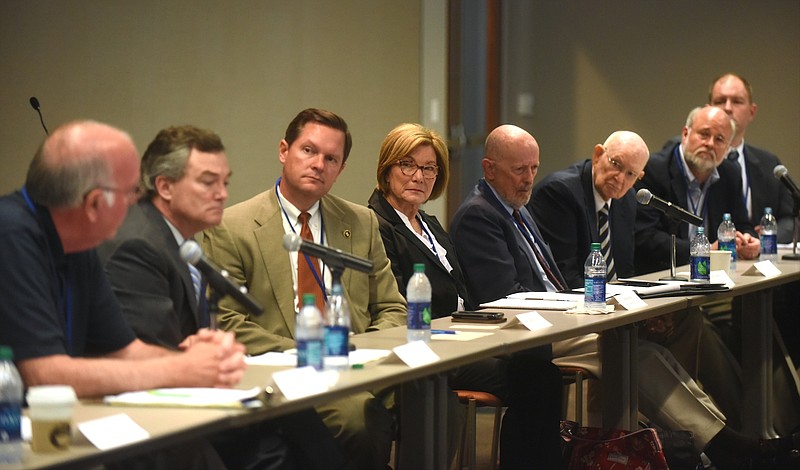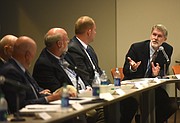A Republican-dominated task force examining ways to expand health care in Tennessee might be favoring a phased-in approach that would initially cover only a small percentage of the state's uninsured, but might then be expanded assuming the program meets its goals.
"We might put in a partial population, and then once we are sure we can control the cost, and that the program is functioning as it should be," it could be expanded, said task force member Rep. Cameron Sexton, R-Crossville, who led a panel that spent two hours Tuesday morning in a community room at BlueCross BlueShield headquarters debating what to do about health care in the state.
Last month, House Speaker Beth Harwell set up the task force in an effort to find alternatives to the Insure Tennessee Medicaid expansion, which lawmakers have voted down twice. Because most of its members are conservative GOP lawmakers, the group's recommendations may be more likely to win the approval of those who opposed Medicaid expansion in the past.
Currently, the majority of Tennesseans are covered by health insurance provided by their employers or their spouses' employers. Some of those who are poor receive Medicaid under TennCare, but the program is limited to the elderly, disabled, and children and their parents, provided their income is less than $26,100 for a family of four.
Since the passage of the Affordable Care Act, another large group buys insurance from a health care exchange, with most purchasers getting a subsidy to help pay for the cost, depending on their income.
But that leaves a significant percentage of Tennesseans with no coverage, including poor people without children and those who earn too little to qualify for subsidies from Obamacare. Estimates range from 300,000 to 450,000 Tennesseans who are uninsured overall, Sexton said.
The original plan for Obamacare was that the maximum income level to qualify for Medicaid would be raised in every state, but that provision was struck down by the U.S. Supreme Court. Thirty-one states have expanded Medicaid on their own, but Tennessee has not.
Harwell's task force was initially attacked by Democrats for including only Republican House members, but it has since added a Democrat, Rep. Karen Camper, D-Memphis. Tuesday's discussion was wide-ranging, with some of the metro area's top medical experts taking part.
Hospital executives were unanimous in supporting some form of expansion, claiming that a large percentage of patients who come to their emergency rooms could be treated more effectively if they had insurance and could see a family doctor.
"That is better for them and a wiser use of resources for the state," said Parkridge East Hospital CEO Jarrett Millsaps.
"This is a huge burden on caregivers," said Erlanger Chief Medical Officer Dr. William Jackson. "To have the utilization of emergency rooms at the level they are in Chattanooga is not a sustainable exercise."
If patients had insurance and could see a family doctor, many problems could be treated before becoming serious, according to Dr. Christopher Young, clinical neuropsychologist at Siskin Hospital for Physical Rehabilitation and past president of the Tennessee Medical Association. "By the time they get to us, we're talking about amputations for diabetes, or putting them on dialysis - things that drive health care costs up," he said.
Young pointed to pregnant women who are using drugs as a particular place to focus.
"The cost of caring for a drug-addicted baby is an extra $50,000 to $60,000," he said. "Earlier intervention to avoid the delivery of a drug-addicted child would be money very well spent."
Several panelists focused on the need for more care for patients suffering from mental or behavioral problems. Sexton said that about a third of all the patients in hospital emergency rooms are suffering from mental or behavioral problems in addition to physical ailments, according to the Tennessee Hospital Association.
Between 25 and 50 percent of jail inmates suffer from a mental or behavioral illness, and probably 75 to 80 percent of them are homeless, said Donna Maddox, director of the Johnson Mental Health Center. And care can be difficult to find.
"For substance abuse, it takes six to eight weeks for females, and 10 to 12 weeks for males, to get them into a bed for uninsured detox in Tennessee," she said.
While there are government-funded or faith-based health care clinics in rural areas of Tennessee, it would be difficult to expand them to provide free care for those without insurance, according to Dr. David McRay a family practice doctor with Saint Thomas Medical Partners in Murfreesboro. Few medical students are willing to go into family practice, where they make less money, particularly in small towns. "New physicians tend to go to larger cities," McRay said. "They graduate with massive debt, and then they go into sub-specialties to pay that off."
Instead of trying to expand free care, McRay said he favored increased insurance coverage to allow lower-income patients to see private doctors including specialists.
"Having insurance to be able to see specialists is important," he said. "We need to provide access to the health system that already exists."
Mental health specialist Maddox said lawmakers also should consider expanding followup care, as well as increasing access to doctors and specialists. Over half of the people who leave her treatment centers fail to keep their aftercare appointments with their doctors, she said. What is needed are more case managers who contact patients to see if they are following their treatment plan.
The panel also heard from business owners who have seen their health care costs rise steadily.
"As health care costs increase, somebody needs to look at whether it is a value-added increase," said Lincoln Christenson, co-owner of the Tennessee Awning Co. "Is it adding to the health care the person is getting?"
At the end of the session, the task force heard from audience members, several of whom told of their difficulties obtaining medical care without health insurance. Charles Michael Allen said his hip had to be replaced after an accident, but after 23 years, the prosthesis failed and his pelvis broke, requiring expensive surgery. He lost his job and was about to switch to his wife's insurance policy when she lost her job as well and had medical problems of her own.
"One day you are functioning as a regular tax-paying citizen and now, all of a sudden, you are impoverished," he said. "We went through my savings and my retirement." Allen said he ended up qualifying for free surgical care through Project Access, a local program where some 800 doctors volunteer their time for those who are unable to pay for specialty care.
Shirley Bagwell told of her concern for her daughter, who is legally blind and suffers from other medical complications. While she has bought a house for her daughter and has been able to care for her so far, that won't always be possible, she said.
"She's 54 years old, and I'm 72," Bagwell said, "and I won't be here for the rest of her life to take care of her."
After wrapping up its public hearings, the task force will meet with federal health officials to see if pilot programs can be established to expand health insurance in the state, according to Harwell.
Whether those programs are put into effect may depend on who wins the U.S. presidential election in November.
Likely GOP nominee Donald Trump has said he favors repealing the Affordable Care Act, but he has not detailed his plans to replace it. Hillary Clinton, the likely Democratic candidate, has said she basically supports the legislation. In a meeting this spring with members of the Times-Free Press editorial board, Tennessee Gov. Bill Haslam said that if Clinton wins, GOP lawmakers may realize that the ACA is unlikely to be repealed and may be more willing to work on ways to expand its provisions.
Contact staff writer Steve Johnson at 423-757-6673, sjohnson@timesfreepress.com, on Twitter @stevejohnsonTFP, and on Facebook, www.facebook.com/noogahealth.

